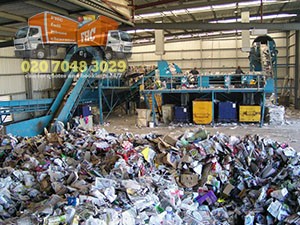In recent years, rubbish recycling in the UK has become an economic necessity, rather than a gesture of good will to the environment. Scarcity of natural resources and raw materials is pushing governments and local authorities toward ever increasing recycling rates – which is not a bad thing at all. If and when population recycles as much as it consumes only then is complete sustainability achieved.
When looking to weigh the cost of raw materials against recycled materials, the difference is more than significant. For instance, manufacturing of glass, steel, paper and aluminium from recycled items and products costs twice as less than having the same derived from raw materials. Only in the case of aluminium the savings are slightly lower – producing soft drink cans for example costs only twenty percent less than manufacturing them using raw materials, but exceptions do not set trends.
Another good example is paper waste. Paper due to its nature and properties is one of the most versatile and useful types of waste as it can be reprocessed in many different ways, at a relatively lower price than some other recyclables. Recycled paper is used for manufacturing of a wide variety of products, including specific items like building boards for example.
Plastics are not as versatile when it comes to recycling as there are different types of plastic. However, plastic waste recycling methods are improving and developing. Currently, technological innovations implemented in the industry allow for both HDPE and PET plastic to be recycled effectively. HDPE plastic rubbish is turned into plastic piping and other plumbing supplies, it is also used for making flowerpots and a bunch of other household items. PET plastic rubbish is often reprocessed into synthetic textiles and carpeting, also synthetic insulation fibres for clothing, buildings and machinery.
 There are also many other examples of items and materials which can be recycled although they are not subject to regular curbside collection by local rubbish removal authorities. Some of these are clean wood, textiles and clothing – all of them used for making of recycled felt carpet underlay. Also exhausted motor oil, which is quite suitable for production of heavy fuel oil. Electrical appliances and electronics are recycled partially or entirely depending on the specific example. Usually electronics and electrics are more valuable in pieces as certain components are made of precious metals like gold and platinum. Local rubbish removal and management authorities provide households and businesses with waste transfer notices indicating how much and what type of waste was reprocessed.
There are also many other examples of items and materials which can be recycled although they are not subject to regular curbside collection by local rubbish removal authorities. Some of these are clean wood, textiles and clothing – all of them used for making of recycled felt carpet underlay. Also exhausted motor oil, which is quite suitable for production of heavy fuel oil. Electrical appliances and electronics are recycled partially or entirely depending on the specific example. Usually electronics and electrics are more valuable in pieces as certain components are made of precious metals like gold and platinum. Local rubbish removal and management authorities provide households and businesses with waste transfer notices indicating how much and what type of waste was reprocessed.
The recycling process itself takes place in MRFs, or Material Recycling Facilities, commonly known as Murfs. MRFs use a combination of mechanical and manual rubbish separation methods. The recyclables are comingled upon arrival at the MRF where they are separated for further processing.
The UK’s recycling objectives are quite clear cut at the moment. The country needs to increase its current recycling rate significantly – eighty percent of waste ends up in landfills, when sixty percent of that same rubbish could potentially be recycled. The UK government aims to recycle forty eight percent of all waste by the year twenty twenty.



